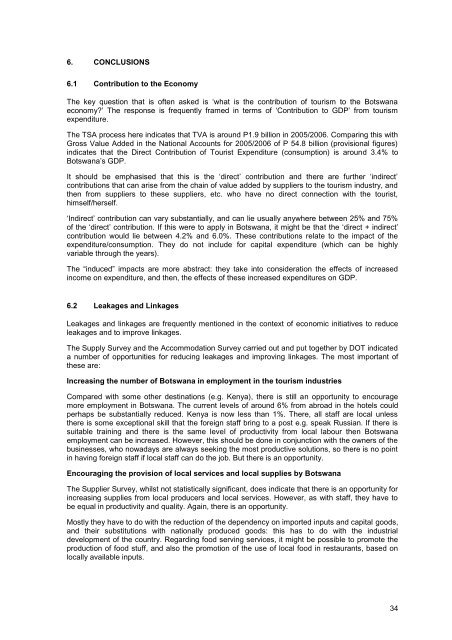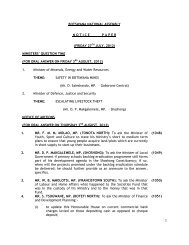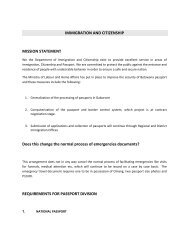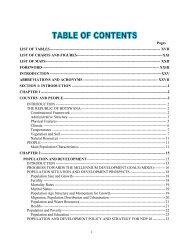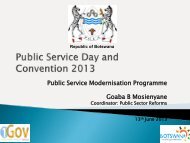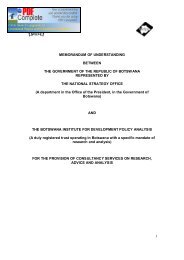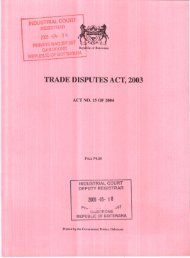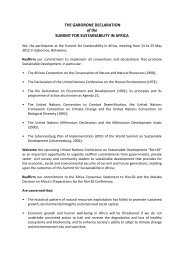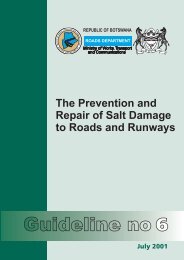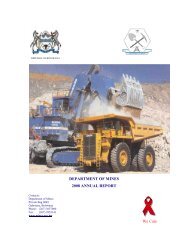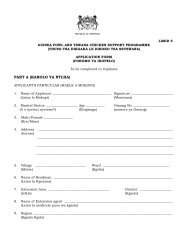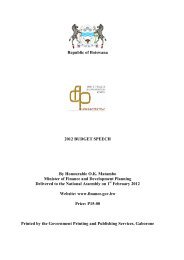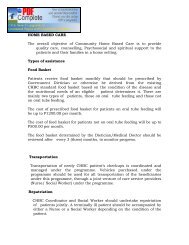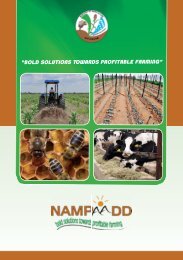Tourism Statistics - Government of Botswana
Tourism Statistics - Government of Botswana
Tourism Statistics - Government of Botswana
Create successful ePaper yourself
Turn your PDF publications into a flip-book with our unique Google optimized e-Paper software.
6. CONCLUSIONS<br />
6.1 Contribution to the Economy<br />
The key question that is <strong>of</strong>ten asked is „what is the contribution <strong>of</strong> tourism to the <strong>Botswana</strong><br />
economy?‟ The response is frequently framed in terms <strong>of</strong> „Contribution to GDP‟ from tourism<br />
expenditure.<br />
The TSA process here indicates that TVA is around P1.9 billion in 2005/2006. Comparing this with<br />
Gross Value Added in the National Accounts for 2005/2006 <strong>of</strong> P 54.8 billion (provisional figures)<br />
indicates that the Direct Contribution <strong>of</strong> Tourist Expenditure (consumption) is around 3.4% to<br />
<strong>Botswana</strong>‟s GDP.<br />
It should be emphasised that this is the „direct‟ contribution and there are further „indirect‟<br />
contributions that can arise from the chain <strong>of</strong> value added by suppliers to the tourism industry, and<br />
then from suppliers to these suppliers, etc. who have no direct connection with the tourist,<br />
himself/herself.<br />
„Indirect‟ contribution can vary substantially, and can lie usually anywhere between 25% and 75%<br />
<strong>of</strong> the „direct‟ contribution. If this were to apply in <strong>Botswana</strong>, it might be that the „direct + indirect‟<br />
contribution would lie between 4.2% and 6.0%. These contributions relate to the impact <strong>of</strong> the<br />
expenditure/consumption. They do not include for capital expenditure (which can be highly<br />
variable through the years).<br />
The “induced” impacts are more abstract: they take into consideration the effects <strong>of</strong> increased<br />
income on expenditure, and then, the effects <strong>of</strong> these increased expenditures on GDP.<br />
6.2 Leakages and Linkages<br />
Leakages and linkages are frequently mentioned in the context <strong>of</strong> economic initiatives to reduce<br />
leakages and to improve linkages.<br />
The Supply Survey and the Accommodation Survey carried out and put together by DOT indicated<br />
a number <strong>of</strong> opportunities for reducing leakages and improving linkages. The most important <strong>of</strong><br />
these are:<br />
Increasing the number <strong>of</strong> <strong>Botswana</strong> in employment in the tourism industries<br />
Compared with some other destinations (e.g. Kenya), there is still an opportunity to encourage<br />
more employment in <strong>Botswana</strong>. The current levels <strong>of</strong> around 6% from abroad in the hotels could<br />
perhaps be substantially reduced. Kenya is now less than 1%. There, all staff are local unless<br />
there is some exceptional skill that the foreign staff bring to a post e.g. speak Russian. If there is<br />
suitable training and there is the same level <strong>of</strong> productivity from local labour then <strong>Botswana</strong><br />
employment can be increased. However, this should be done in conjunction with the owners <strong>of</strong> the<br />
businesses, who nowadays are always seeking the most productive solutions, so there is no point<br />
in having foreign staff if local staff can do the job. But there is an opportunity.<br />
Encouraging the provision <strong>of</strong> local services and local supplies by <strong>Botswana</strong><br />
The Supplier Survey, whilst not statistically significant, does indicate that there is an opportunity for<br />
increasing supplies from local producers and local services. However, as with staff, they have to<br />
be equal in productivity and quality. Again, there is an opportunity.<br />
Mostly they have to do with the reduction <strong>of</strong> the dependency on imported inputs and capital goods,<br />
and their substitutions with nationally produced goods: this has to do with the industrial<br />
development <strong>of</strong> the country. Regarding food serving services, it might be possible to promote the<br />
production <strong>of</strong> food stuff, and also the promotion <strong>of</strong> the use <strong>of</strong> local food in restaurants, based on<br />
locally available inputs.<br />
34


